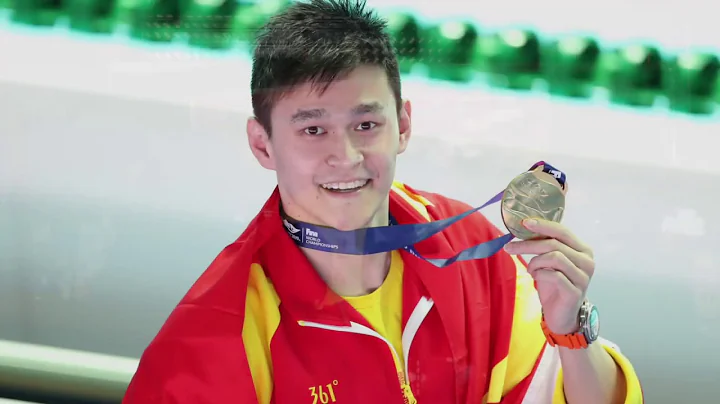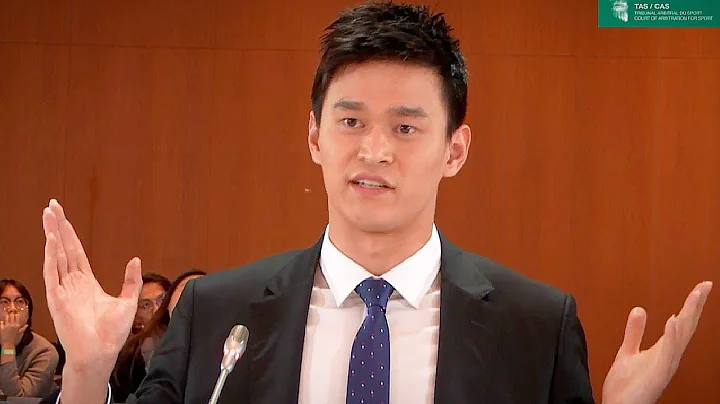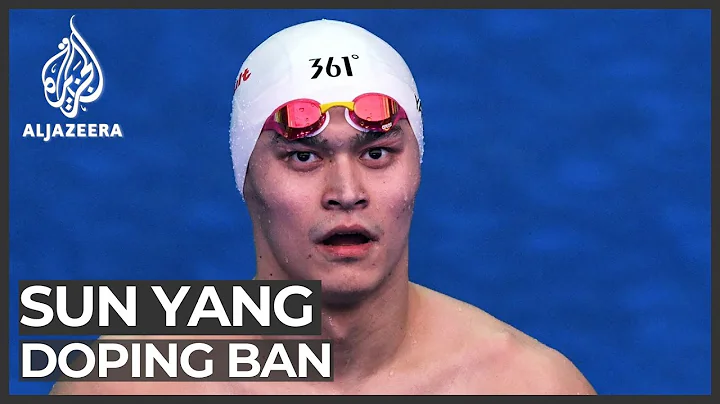The "Sun Yang case" is not an isolated case. Whether in the world competition or the domestic professional league, Chinese sports have suffered from relevant industry rules, laws and regulations.
At the end of last month, the International Court of Arbitration for Sport (CAS) announced the arbitration result in the case of the World Anti-Doping Agency (WADA) v. Sun Yang and the International Swimming Federation (FINA): Sun Yang was banned from swimming for eight years, effective immediately. Although Sun Yang has appealed, the chance of a comeback is slim.
In addition to the Sun Yang case, Chinese sports have suffered losses from relevant industry rules and laws and regulations before, such as the contract dispute between the Chinese Football Association and Camacho, the Chinese women's sprint relay team being squeezed out of the Rio Olympic finals by its opponents, and weightlifters Li Yajun lost the Olympic gold medal for "ignoring" the rules. The reason why Guoan and Evergrande were able to win the "international lawsuit" was that they understood the rules thoroughly, dealt with them professionally, and mastered a complete "evidence chain" that was beneficial to them.

Sun Yang at the hearing.
Case 1 Sun Yang received a "textbook-like international sports arbitration award"
html On February 28, CAS announced the results of the hearing between WADA v. Sun Yang and FINA: Sun Yang was banned from competition for 8 years. After learning the verdict, Sun Yang decided to appeal to the Swiss Federal Supreme Court. On March 5, CAS published the full text of the 78-page judgment. After careful analysis of the judgment, many professionals believe that Sun Yang's success rate in making a comeback is extremely low.On the evening of September 4, 2018, Sun Yang underwent an out-of-competition test by the International Doping Testing Management Company (IDTM) at his residence. Due to doubts about the identity of the tester, Sun Yangfang had a dispute with the tester and the test was not completed. On November 19 of the same year, FINA, which received the relevant IDTM report, held a hearing in Lausanne, Switzerland, and made a ruling on January 3, 2019, holding that Sun Yang was not responsible.
WADA, which was dissatisfied with FINA's ruling, appealed to CAS. The latter held a hearing on November 15, 2019, and announced the result of Sun Yang's eight-year ban on February 28, 2020. The award published by
CAS was called "a textbook international sports arbitration award" by professionals. The outside world saw more details of this case. Previously, "Sun Yangfang believed that WADA submitted the complaint late, resulting in the arbitration being ineffective." Questions such as "Why was the admissibility request rejected?" and "Whether Richard Young (who once worked at FINA) was suspected of a conflict of interest as WADA's attorney?" were all answered in the judgment.
The published judgment, hearing videos and other official materials show that Richard Young indeed applied the rules to the extreme, while Sun Yang’s understanding, mastery and application of the relevant rules were not ideal, and even the main points they proposed Almost none of the arguments were accepted. Although Sun Yang has appealed, the revocation of the judgment only exists within a very limited scope, so it is considered to lack a solid reason to reverse the case.

Camacho, the former coach of the national football team. Picture/Osports
Case 2 The Chinese Football Association paid Camacho a sky-high liquidated damages
As the 26th coach of the Chinese men’s national football team, Camacho left more than just 20 official games for Chinese football with 7 wins, 2 draws and 11 losses, and a warm-up These "tragic incidents" such as the 1-5 defeat to the Thai Youth Army and the Spanish coach's victory in the "contract dispute" with the Chinese Football Association have left Chinese football and even Chinese sports to reflect more.
In August 2011, Camacho officially became the head coach of the national football team. His team's total annual salary is approximately 4.5 million euros after tax, and his personal annual salary is 2.8 million euros after tax. Due to poor performance and many humiliating records, the Chinese Football Association unilaterally terminated Camacho's contract in June 2013. It was called unilateral because the Football Association and Camacho's lawyer failed to negotiate the termination of the contract. Agree on compensation.
At that time, Camacho said in a statement issued by his attorney: "I will apply for assistance from FIFA and the International Court of Arbitration for Sports in Switzerland." The lawsuit between the two parties did not come to an end until the end of 2016 - FIFA The United Nations made a ruling requiring the Chinese Football Association to pay Camacho liquidated damages, and the Spanish coach received compensation of up to 50 million yuan.
This protracted dispute has not only brought high compensation to Chinese football, it was even considered to affect the prospects of the national football team in the 2015 World Cup preliminaries.In the opinion of professionals, the most fundamental reason why the Chinese Football Association lost the "Camacho Contract Dispute" was that there were huge loopholes in the contract signed by the two parties. There were no performance indicators as binding clauses in the contract, and the contract was terminated without professional review. It took effect, the content and procedures are extremely unprofessional. After the incident, relevant departments went to the Football Association to investigate, but the loopholes in the contract could not be made up or saved.

At the Rio Olympics, the U.S. women's relay team lost its batons and successfully appealed for a rerun. Picture/Osports
Case 3 The Chinese women’s relay team suffered a “dumb loss” in Rio
For the Chinese women’s sprint, the 2016 Rio Olympics is undoubtedly a memory that they don’t want to mention, Yuan Qiqi , Wei Yongli , Ge Manqi Four Chinese girls, Liang Xiaojing and Liang Xiaojing, had already made history and reached the Olympic 100-meter relay final again after 16 years. However, the American team's separate rematch made the girls return without success, and their final places were eventually squeezed out by their opponents.
After the preliminaries of the women's 100-meter relay ended, the Chinese team ran 42.70 seconds. The big screen at the scene also displayed the message "8th place, Chinese team, 42.70 seconds, advance." The four girls had already begun to celebrate, Su Bingtian , Xie Zhenye, and other men's team members also came to congratulate and celebrate the historic moment when the men's and women's teams entered the finals together.
However, bad news soon came to the scene. The American team, which had no results due to a stick drop error in the preliminaries, filed an appeal, claiming that it had been interfered by the Brazilian team and requested a rematch. After the organizing committee ruled, the American team's appeal was successful. Allowed to re-run alone. After learning of the news, the Chinese track and field team immediately complained, and the Chinese Athletics Association also protested against the US team's rematch, but it was ultimately rejected.
Feng Shuyong, then deputy director of the Field Management Center of the General Administration, said fiercely on social media at the time: "The referee ruled that the Brazilian team committed a foul in the women's 4×100 meter relay preliminaries, which affected the American team. The Brazilian team can be disqualified according to the rules. But it is an unheard-of joke to judge that the American team can rerun alone. "
After the American team successfully advanced in the rematch, the Chinese team, which was squeezed out of the finals, appealed again, hoping to allow the eight teams that had originally advanced and the American team. They advanced to the finals together, and the five teams with the best scores were divided into one group, and the four teams with the lowest scores were in another group, but they were not accepted in the end.
Afterwards, Wei Yongli, Ge Manqi, Liang Xiaojing and other team members all expressed their dissatisfaction on social media for being squeezed out of the finals. Domestic media and even some foreign media also condemned the organizing committee's penalty.
But judging from the results, China's track and field suffered a "dumb loss" in the Olympics. This is actually inextricably linked to our understanding and emphasis on the rules. Looking back at the US team, their meticulous study of the rules is worthy of our reflection. According to Liu Chi, a lawyer at Beijing JunZeJun Law Firm and experienced in international sports arbitration, the U.S. track and field team is equipped with a dedicated team lawyer, which plays a decisive role in helping them understand the rules and apply them in a timely manner to appeal.
Case 4 Li Yajun lost the Olympic gold medal that he "eat to his mouth"
html There was an opportunity to change his destiny 04 years ago, but he missed it bizarrely.On August 8, 2016, Li Yajun was the most powerful contender for the gold medal in the women's 53kg weightlifting competition at the Rio Olympics.
In the snatch competition, Li Yajun ranked first with a score of 101 kilograms, breaking the Olympic record, followed by Chinese Taipei player Xu Shujing with 100 kilograms.
After the clean and jerk began, Xu Shujing lifted 112 kilograms for the first time. Li Yajun was about to lift 123 kilograms at the beginning and successfully lifted it. Judging from the on-site referee's display, there is one red light and two white lights, which means the trial lift was successful. But a few seconds later, the referee changed the penalty. Li Yajun's score changed to two red lights and one white light, and the first clean and jerk failed.
But Li Yajun and the Chinese team's coaching staff did not notice the change in these few seconds. They immediately returned to the backstage to prepare the last two clean and jerks. In the next two lifts, Li Yajun increased the weight to 126 kilograms, but failed in both attempts. Even so, Li Yajun and the coaching staff still thought they had secured the gold medal with their first clean and jerk, and they started taking photos backstage to celebrate.It wasn't until they saw Xu Shujing starting to celebrate that they realized that the gold medal had gone to someone else. The Chinese team lost the gold medal that they almost had in their mouths, and Li Yajun also missed the opportunity to rewrite his life.
According to the relevant rules of the International Weightlifting Federation, if you have any doubts about the referee's penalty, you can appeal immediately after the trial lift. By the time the Chinese team realized something was wrong and prepared to appeal, the entire game was over and the time to appeal had already been missed. In the end, the Chinese team gave up its appeal.
In competition weightlifting, even if the athlete lifts, he may not be successful. The referee will make the final penalty based on whether the athlete bends his elbow, whether his body shakes, etc. At this time, a coach needs to be on the sidelines waiting for the referee's final decision. As soon as there is a problem, apply for arbitration immediately. The Chinese team is not unaware of such rules and procedures. But even on a top stage like the Olympics, such small details are still overlooked, which only shows that our research and use of the rules are not thorough enough.

Barrios (right), the former Evergrande champion. Picture/Osports
Case 5 Guoan won the “first case in Chinese football”
Since the Chinese Football League became professional, clubs often lose more than they win when encountering international lawsuits, but it is not without winning cases. In 2006, Beijing Guoan won a lawsuit against foreign aid Alex, which was one of the classics. At that time, it was called "the first in the history of a Chinese club" by the outside world.
In January 2006, Beijing Guoan’s Romanian foreign aid Alex asked for leave from the Guoan club to return to China due to family health reasons. However, not long after he returned to China, Dinamo Bucharest held a joining ceremony for him. At this time, he still had a one-year contract with Guoan. . Alex, who unilaterally breached the contract, took the lead and hired Gian Paulo, the former chairman of FIFA's Player Rights Protection Committee, as a lawyer to sue Guoan to FIFA, claiming that Guoan had restricted the player's free status. In the eyes of the outside world, Guoan’s lawsuit has little chance of success. It is reported that if Guoan loses the lawsuit, it will not only face a high fine, but will also be banned from international player transfers for two years.
The intervention of a professional became a turning point - Guoan's partner at the time, Real Madrid, recommended the club's "Queen's Lawyer" Juan • Crespo to help Guoan. Li Xiaoming, the then general manager of the Guoan Club, revealed that Juan was very experienced in facing such lawsuits and "well understood what kind of evidence should be provided and what rules should be applied in this case." Under Juan's guidance, Guoan Club provided 80 pages of various materials and evidence to FIFA. In the end, Alex's side took the initiative to seek peace and paid liquidated damages to Guoan.
Li Xiaoming later concluded that the reason why domestic clubs lose lawsuits is often the details. For example, the contract signed between the club and the players is to pay wages and bonuses every month. Due to various reasons, the club sometimes settles the bill once every two months. Once the two parties are involved in a lawsuit, this becomes a loophole that the other party's lawyers can seize, because the bank documents provided by the club cannot prove that the salary is paid monthly as stipulated in the contract.
In 2013, Guangzhou Evergrande encountered a similar situation to Beijing Guoan. Paraguayan foreign aid Barrios "lost contact" with the club after returning to his country during the hiatus. Afterwards, his agent publicly stated that Barrios would leave the team as a free agent due to Evergrande's unpaid wages. Evergrande responded quickly, hired a top European lawyer to represent the case, filed a complaint with FIFA, and prepared more than 100 pages of relevant evidence and complaint materials after deciding to appeal. FIFA ruled in this case that Barrios' transfer would not be accepted, and the Paraguayan took the initiative to publicly apologize to Evergrande.
In August 2013, Evergrande announced that it would sell Barrios to the Russian Super League club Spartak Moscow and transfer him out at a reasonable price (Evergrande spent 8.5 million euros to introduce Barrios).
(Beijing News reporters Zhou Xiao, Xu Bangyin, Sun Haiguang)















![[MV] We Sink - SWAY (스웨이) _ My Liberation Notes (나의 해방일지) OST Part 6 - DayDayNews](https://i.ytimg.com/vi/FwDG0wsXUWE/hq720.jpg?sqp=-oaymwEcCNAFEJQDSFXyq4qpAw4IARUAAIhCGAFwAcABBg==&rs=AOn4CLCxUrXzkzPzx76EB9IvWGT4fqWyKA)





![Son Suk-ku admits he's a fool for Kim Ji-won | My Liberation Notes Ep 7 [ENG SUB] - DayDayNews](https://i.ytimg.com/vi/998pa8pGbWE/hq720.jpg?sqp=-oaymwEcCNAFEJQDSFXyq4qpAw4IARUAAIhCGAFwAcABBg==&rs=AOn4CLDN4ZmJTVCBU3RMVYwLSm_Ha6-tGQ)
![My Liberation Notes | Official Trailer | Netflix [ENG SUB] - DayDayNews](https://i.ytimg.com/vi/FQEm4dPZsNo/hq720.jpg?sqp=-oaymwEcCNAFEJQDSFXyq4qpAw4IARUAAIhCGAFwAcABBg==&rs=AOn4CLDt8OwfQjf50uanB6kyySnd-USRCg)